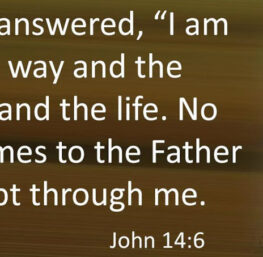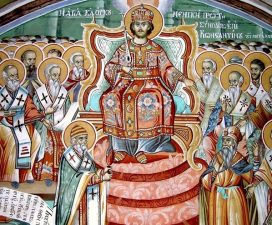by Mark Tooley – It’s a wonderful mercy that much of the more extreme elements of radical feminist theology in the churches peaked in the 1990s and have since faded. The high tide of radical feminist theology was the 1993 ecumenical Re-Imagining Conference, endorsed by nearly all the Mainline Protestant denominations or their women’s agencies, where speakers condemned traditional Christianity as patriarchal and instead acclaimed ancient feminine deities like Astarte, Isis, and Athena. God was also commonly called “Sophia,” based on the Greek word for wisdom. There was a special altar call for lesbians, not for repentance, but for acclamation. A milk and honey ritual replaced the traditional Eucharist.
Of course, Re-Imagining was enormously controversial, even earning an episode on Ted Koppel’s Nightline. Although there were subsequent Re-Imagining reunions, few of the Mainline groups again endorsed, and the Re-Imagining Community eventually dissolved. Radical feminist theology, which deemed the traditional Jewish-Christian deity as unacceptably patriarchal, has mostly retreated into the tenured faculty of the most liberal Protestant seminaries. Its constituency never fully expanded beyond mostly older, white, upper income church women in declining denominations or from small, dissident Catholic groups. Predictably, no orthodox church group has been able to thrive while minimizing historic core doctrines, like the Trinity or Atonement, which radical feminist theology dismissed as the imagined fancies of ancient chauvinistic men in robes. Like most liberal theology, radical feminist theology assumes that God does not self-disclose as objective reality but rather is a human-projection, and therefore can be routinely reinvented to suit desires and fashion.
Like most liberal theology, radical feminist theology assumes that God does not self-disclose as objective reality but rather is a human-projection, and therefore can be routinely reinvented to suit desires and fashion.
But strains of feminist theology persist, though often more subtle. It is not uncommon in some Protestant circles for sometimes otherwise orthodox preachers to persistently avoid all personal pronouns for the deity. Since “he” and “him” are deemed potentially offensive, “God” instead is cited repeatedly like rapid, repetitious fire from a Gatling gun. This semantic ploy, if it must be used, might be somewhat less grating if some traditional alternative names were also used, like the “Almighty,” or simply “Lord.” Some preachers say “God-God-God” without personal pronouns based on conviction, or imagined potential offense for a feminist in the congregation, or because a seminary demanded this practice. Some Mainline Protestant seminaries require “inclusive” language for all references to the deity. Ardent liberals will even avoid traditional Trinitarian language, substituting “Creator-Redeemer-Sustainer” for “Father-Son-Holy Ghost.”
Christians and Jews worship a Spirit who is not a man or woman, though Christians of course believe that God did become man in Jesus Christ. Jewish and Christian Scriptures always refer to God in masculine terms, while sometimes metaphorically likening God’s love to a hen protecting her chicks or a woman searching for a lost coin. God in neither Old or New Testament is ever referred to as “she” or “her.” Some theologians speculate that, among other reasons, the transcendent God of the Jews was entirely distinct from the very gendered and sexualized pagan deities, some of which literally gave birth to creation. The Jewish God created by fiat, not birthing. Jesus called God “Father,” and there is no scriptural reference of a Heavenly Mother. An unauthorized United Methodist hymnal supplement of 10 years ago included hymns titled: “I Am Your Mother,” “Mothering God You Gave Me Birth,” and “Womb of Life,” benignly intertwined with more traditional anthems like “Eternal Father, Strong to Save,” the Navy’s traditional hymn. There’s no evidence that any of these “Mother” hymns has gained a wide following.
The rising new Evangelical Left is anxious to repeat many of the same mistakes that took Mainline Protestantism from the center of America’s religious to the sideline.
The rising new Evangelical Left is anxious to repeat many of the same mistakes that took Mainline Protestantism from the center of America’s religious to the sideline. So it was inevitable that some Evangelical Left voices would encourage feminist friendly gender-neutral God language. A recent commentary in Jim Wallis’ Sojourners comes from a woman Presbyterian minister, who apparently learned “inclusive language” at McCormick Theological Seminary in Chicago. “Using inclusive language makes room for the diversity of God’s people to feel equally valued, included, acknowledged, and invited to participate in God’s community,” she explains, as she struggled to overcome her conservative Southern Baptist background. She recalled attending a feminist theological conference where “Godde” was offered as a compromise between God and “Goddess.” Apparently this was advocated by older women, while the younger women were somewhat discomfited. Currently based at a “diverse” San Francisco church, this minister now feels a “connection with God as Mother, Bosom, and Nurturer.” …




Well, what can one say? “The times, they are a-changin’.” And, I think, are about to change back again. And to all you feminists and modernists: “Don’t criticize what you can’t understand.”